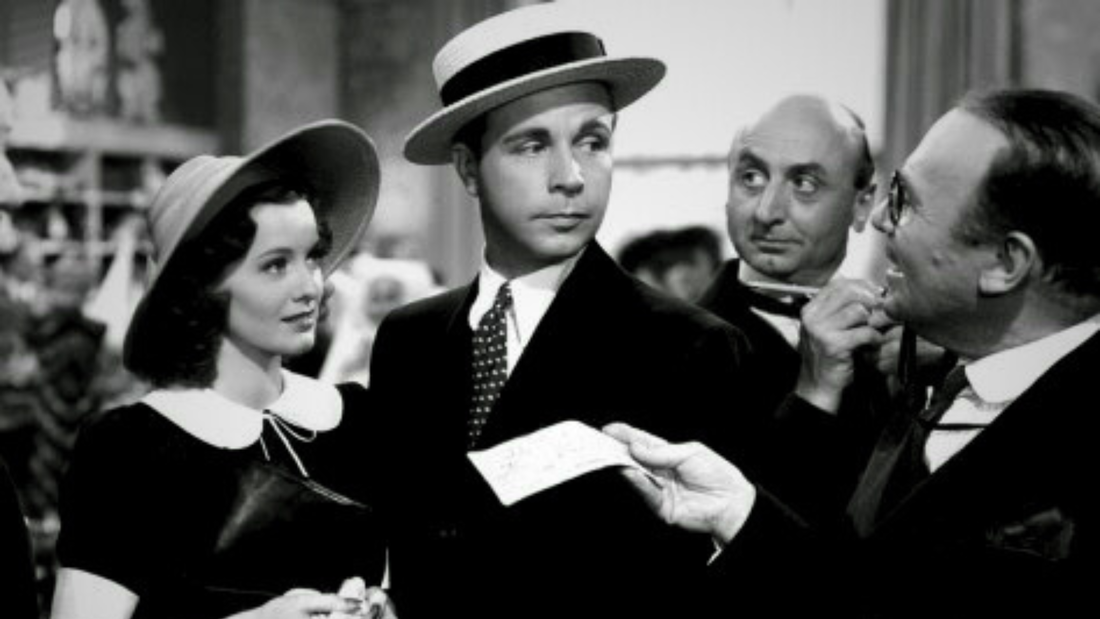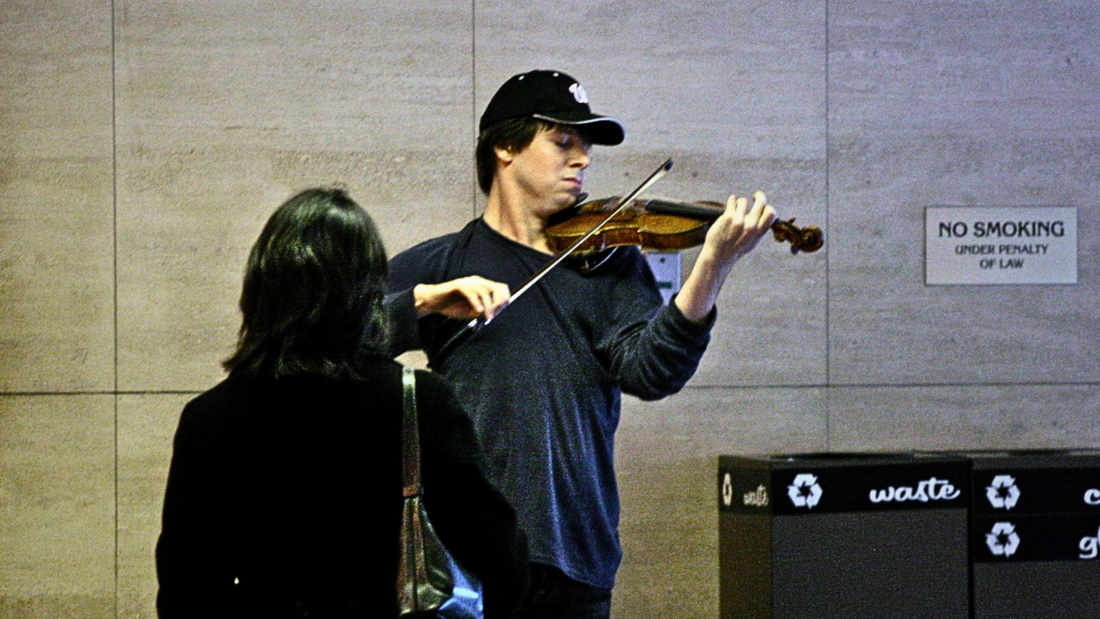|
How social cues, context, and boundaries influence our behaviors.
Read the full story ⬇︎
His latest creation is nearly 300 years old, and yet musicians are willing to spend millions of dollars for it. Antonio’s reputation as a craftsman of the finest violins in the world is reminiscent of comedian Steve Martin’s advice: “Be so good they can't ignore you.”
But it seems Joshua didn’t get the memo. He performed a free 45-minute concert at the L'Enfant Plaza subway station in Washington, D.C. on one of Antonio’s violins—a famed Stradivarius that he paid a whopping 3.5 million dollars for. The Grammy Award winning violinist is one of the most celebrated artists of our time—with ticket prices for his concerts going for hundreds of dollars around the world—but on the morning of Friday January 12, 2007, he only made $32 and change. In his defense, of the 1,070 people who walked by him, only 27 people seemed to actually notice him—the rest looked through him as if he wasn’t even there.[1] By Steve Martin’s standards, Joshua Bell wasn’t very good. Social Cues Popular opinion has often been influenced by social cues, as depicted in the Preston Sturges film Christmas in July.[2] In the film, Dick Powell plays Jimmy MacDonald, an advertising clerk who enters a slogan contest for Maxford House Coffee—vying for the top prize of $25,000. His slogan? “If you can't sleep at night, it's not the coffee, it's the bunk.” His co-workers knew it was a terrible slogan, so they played a prank on Jimmy by delivering a fake telegram from Maxford House Coffee stating he had won the contest. When Jimmy’s boss heard this, not realizing it was just a joke, he was so impressed that he promoted Jimmy to an advertising executive on the spot—complete with his own office, a private secretary, and a handsome raise. This promotion had nothing to do with the quality of Jimmy’s work, however. It was solely based on the social cue of perceived popular opinion. While this story is only a work of fiction, it does point to something that is real. Presentation & Perception A number of marketing surveys have attempted to gauge how presentation affects consumer perceptions—with many finding that people will often judge one of two identical items as distinctively higher quality simply because of a more “attractive” presentation.”[3] A shoe retailer named Palessi discovered how the frame of presentation can affect perception when their customers were willing to pay upwards of $600 for a pair of shoes. Their secret? They put fancy decor in their store and invited social media influencers to check out their brand. The mental boundary formed by this presentation created a perception of quality that influenced their purchasing behaviors. Their real secret? Palessi is just another name for Payless Shoes. In 2018 they conducted this social experiment (marketing ploy) to demonstrate how the quality of their shoes are indistinguishable from high-end shoes—just with a different frame.[4] The frame we use—whether for a work of art, for a consumer good, for a service, or for ourselves—creates a contextual boundary that offers cues for how we expect to be treated. Boundaries The word boundary is derived from words meaning limits—the furthest point of extension of any one thing—and today it generally refers to the dividing lines marking where one thing ends and another begins. Boundaries are important in our relationships because they help us build trust, safety, and respect—however, they are equally important in every aspect of our lives. Without boundaries, we lack cues for where one thing ends and another begins—and how are we to know how close is too close or how far is too far? How can we cross a line when there is no line to cross? Crossing Boundaries The fame of Stradivarius violins is so widespread that they command millions of dollars—however, much like Payless, blind listening tests over the years have found no difference in sound between Stradivari's violins and high-quality violins in comparable styles by other makers and from other time periods.[5] [6] What’s the difference? For hundreds of years, all of the best violinists have owned or played a Stradivarius, and this frame of public perception carries on to every new generation of violinists. When Joshua Bell bought the $3.5 million Stradivarius he performed with at the subway station, he had to sell his own Stradivarius and then borrow the rest of the money to pay for it. Yet people in the subway station missed their opportunity to listen to one of the greatest violinists of our time playing one of the most expensive violins in the world because a boundary had been crossed. His work was given a different frame than it was usually given. Joshua later explained: “When you play for ticket-holders, you are already validated. I have no sense that I need to be accepted. I’m already accepted.” But framed with street clothes in a bustling public setting, his work wasn’t validated, reminiscent of Joni Mitchell’s song “For Free.” “...across the street he stood and he played real good on his clarinet, for free … Nobody stopped to hear him, though he played so sweet and high. They knew he had never been on their TV, so they passed his music by.”[7] Self-Perception John Picarello dreamed of being a concert violinist, but by the time he was 18 years old he gave it up, deciding that he’d never be good enough—so he did the prudent thing and became a postal worker instead. But his years of study in classical music is partly why he stopped to listen that morning at the subway station. He had heard musicians play there before, but there was something different about this one. Despite the bustling public place—despite having the wrong frame—John recognized the sound: “This was a superb violinist. I’ve never heard anyone of that caliber. He was technically proficient, with very good phrasing. He had a good fiddle, too, with a big, lush sound.” Turns out, John is a big fan of Joshua Bell, but having the wrong frame, he didn’t recognize the famed violinist. He stood at a distance, listening intently and looking around him, bewildered by the other people who didn’t hear what he was hearing. “Other people just were not getting it. It just wasn’t registering. That was baffling to me.” Before leaving, John “humbly threw in $5” before quickly walking away from the man he once wanted to be.[8] Final Thoughts When we fail to see the beauty around us, perhaps it’s not so much that we lack the capacity to recognize and understand beauty in our world—perhaps this beauty simply lacks the frame that provides a contextual boundary. We pass it by, because it doesn’t appear relevant to us. When we’re not being treated the way we would like to be treated, perhaps it’s not so much that other people lack the capacity or willingness to treat us with respect—perhaps it’s just that our boundaries have not been properly framed. We feel as if lines are being crossed, but to others there is no line to cross, because we haven’t given ourselves the proper frame. And perhaps this boundary is just as important for how we perceive ourselves. Our self-perception shapes what we believe about ourselves, influencing what we give our attention to and the decisions we make about what is worthy of our time and energy. I wonder where John Picarello might be if he had given himself a different frame? Reflection How do the contextual boundaries you encounter shape your experience of the world around you? What might you be missing? Want More? Jonas Cain, M.Ed. is a storyteller, magician, musician, and facilitator of fascination on a mission to help individuals, teams, and communities in “Being Well by Living Well” to experience abiding joy—at work, at home, and wherever life takes you. Connect with Jonas today to discuss your challenges, goals, and obstacles: [email protected] REFERENCES [1] Weingarten, G. (2007, April 8). “Pearls Before Breakfast.” Washington Post. [2] Sturges, P. (Director). (1940). Christmas in July [Film]. Paramount Pictures [3] Mikkelson, D. (2008, December 29). “Did violinist Joshua Bell play incognito in a subway? Do we perceive beauty? Do we stop to appreciate it? Do we recognize the talent in an unexpected context?” Snopes. https://www.snopes.com/fact-check/joshua-bell-company/ [4] Phillips, K. (2018, November 30). “They had us fooled: Inside Payless’s elaborate prank to dupe people into paying $600 for shoes.” Washington Post. https://www.washingtonpost.com/business/2018/11/30/they-had-us-fooled-inside-paylesss-elaborate-prank-dupe-people-into-paying-shoes/ [5] Coggins, A. (2007, February). "Blind listening tests". The Strad: 52–55. https://www.westerlunds.se/stradeng.htm [6] Yong, E. (2012, January 2). “Violinists can’t tell the difference between Stradivarius violins and new ones.” Discover Magazine. https://www.discovermagazine.com/the-sciences/violinists-cant-tell-the-difference-between-stradivarius-violins-and-new-ones [7] Mitchell, J. (1970). For Free [Recorded by J. Mitchell]. On Ladies of the Canyon [Album]. Reprise & Warner Bros. [8] Weingarten, G. (2007, April 8). “Pearls Before Breakfast.” Washington Post. https://www.washingtonpost.com/lifestyle/magazine/pearls-before-breakfast-can-one-of-the-nations-great-musicians-cut-through-the-fog-of-a-dc-rush-hour-lets-find-out/2014/09/23/8a6d46da-4331-11e4-b47c-f5889e061e5f_story.html
0 Comments
Leave a Reply. |
AuthorJonas Cain, M.Ed. is a storyteller, magician, musician, and facilitator of fascination on a mission to help you experience abiding joy. Topics
All
SubscribeArchives
July 2024
|




















 RSS Feed
RSS Feed
